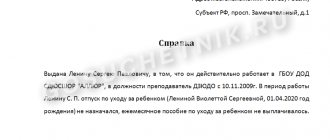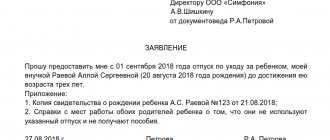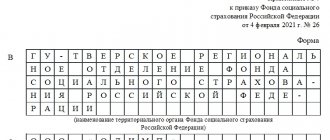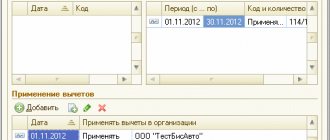Article 256 of the Labor Code is devoted to leave to care for a child.
It examines such nuances as its documentation, parameters of payments due to the employee, and the possibility of partially continuing work during vacation. Labor Code of the Russian Federation
dated December 30, 2001 N 197-FZ
Full text of the article, guides, additional information - in ConsultantPlus
Is maternity leave considered maternity leave?
Parental leave must be distinguished from maternity leave, which is leave granted in connection with pregnancy and childbirth (Article 255 of the Labor Code of the Russian Federation) and issued with sick leave. Its name goes back to the decree “On Maternity Benefits” issued in 1917 in Russia.
Maternity leave is mandatory and is given only to the mother. Leave to care for a child up to 1.5 years old (Article 256 of the Labor Code of the Russian Federation) is taken at will, can be used in parts, be provided not only to the mother, but also to other persons actually caring for the child, and allows for the possibility of continuing (resuming) work during it on a part-time basis.
Expert advice will help you arrange parental leave wisely. Get free trial access to ConsultantPlus and go to the material.
Making a statement
A well-written application guarantees you no problems at subsequent stages. It must be written in person; it must indicate the reason and time frame during which the employee will be absent from work. In addition, the paper must reflect the request for the accrual of benefits. The document looks like this:
• “header” - it is located in the upper right corner of the document. It indicates the full name of the applicant employee, her position, the name of the organization, as well as the surname and initials of the immediate supervisor; • the title of the document “Application” is written without quotation marks and is located in the middle; • the main text of the document can be written in free form, the main thing is to accurately and correctly indicate the need for leave, write its correct name, indicate the dates and periods when you will be absent from work. Don't use the word maternity leave! • do not forget to indicate the need to accrue benefits; • then list all the documents that you are attaching to the application: the original sick leave certificate and a doctor’s certificate confirming the pregnancy and indicating the dates; • in the lower right corner the applicant signs, dates and writes her last name and initials.
Can going on maternity leave without authorization lead to dismissal?
Obtaining parental leave depends only on the desire of the child’s mother to take it, expressed in the application. The employer does not have the opportunity not to provide such leave. So, having written the necessary application, a woman can go on vacation without waiting for the employer’s decision. Even if the latter is not satisfied with this situation, he will not be able to fire the employee for absenteeism (decision of the Moscow City Court dated November 12, 2012 in case No. 11-6805).
For more information on how to fill out an application for parental leave, read the article “Application for parental leave - form and sample” .
If the corresponding leave is taken not by the mother, but by the father or another person, simultaneously with the application, the employer must submit a document confirming that the child’s mother (or both parents, if it is not the parent who takes the leave) is either working (and such leave has not been issued at work), or is unemployed. A person who has taken out such leave is fully covered by all the guarantees provided by Article 256 of the Labor Code of the Russian Federation:
- maintaining his job;
- the ability to use vacation in parts;
- receiving care benefits;
- the opportunity to resume work on a part-time basis while maintaining benefits;
Read about how the working day must be reduced in order for benefits to be maintained here.
- accounting for vacation time in the length of service.
What benefits are paid during parental leave in 2020–2021?
For a person who has taken leave to care for a child, Article 256 of the Labor Code of the Russian Federation secures the right to receive benefits at work related to this leave. Including benefits are paid in case of part-time work. Moreover, it does not matter where the employee continues to work under such conditions: where he is paid benefits, or in another place.
The types and amounts of benefits provided for in Article 256 of the Labor Code of the Russian Federation (with comments for 2020–2021) are as follows:
- Monthly allowance for child care up to 1.5 years (Article 14 of the Law “On State Benefits for Citizens with Children” dated May 19, 1995 No. 81-FZ). It is estimated as 40% of the employee’s average earnings determined for the 2 years preceding the vacation. However, there is an upper limit to its size, defined as the sum of the maximum values from which contributions to the Social Insurance Fund were paid in each accounting year, divided by 730 (clause 3.3 of Article 14 of the Law “On Compulsory Social Insurance in Case of Temporary Disability and in Connection with Maternity " dated December 29, 2006 No. 255-FZ), as well as the minimum benefit amount.
What are the maximum and minimum benefits in 2021, see ConsultantPlus. Trial access to this and other system materials can be obtained free of charge.
In case of interruption of vacation and return to work full-time, payment of benefits is terminated (letter of the Ministry of Labor of the Russian Federation dated May 16, 2013 No. 13-7/3030623-2831).
- Monthly compensation in the amount of 50 rubles. (Decree of the President of the Russian Federation dated May 30, 1994 No. 1110), paid until the child reaches 3 years of age and calculated taking into account the regional coefficient (Decree of the Government of the Russian Federation dated November 3, 1994 No. 1206).
Important! From 2021, compensation is 50 rubles. for child care under 3 years old has been cancelled. It must continue to be paid only for children born before 12/31/2019 inclusive (Presidential Decree No. 570 dated 11/25/2019).
- Additional payments established by regional laws, made at least once a quarter (Article 16 of Law No. 81-FZ).
Thus, parental leave provided for in Art. 256 of the Labor Code of the Russian Federation, taking into account comments regarding the timing of payment of benefits during it, is divided into 2 parts:
- up to 1.5 years, for which payment of all types of established benefits is mandatory, including monthly care allowance;
- from 1.5 to 3 years, during which care allowance is not paid, but compensation established by Decree No. 1110 continues to be paid (for children born before 2021), as well as additional payments established in the region (if the corresponding regional legislative act).
An exception is the care allowance paid to citizens affected by radiation during the Chernobyl disaster. For them, it is set at double the amount and is paid until the child turns 3 years old (Decree of the Government of the Russian Federation dated July 16, 2005 No. 439, order of the Ministry of Health and Social Development of the Russian Federation dated December 1, 2008 No. 692n).
Read more about how child benefits are assigned here .
Guarantees for parents of children under 3 years of age
Source: Zarplata magazine
In the last issue of the magazine, we talked about the guarantees and benefits provided to pregnant employees. In this article we will begin a conversation about the guarantees and benefits established by the Labor Code for women with children and other persons with family responsibilities.
Guarantees and benefits for employees with children and other employees with family responsibilities make it possible to provide women and men with more favorable conditions for combining the functions of motherhood and fatherhood with professional activities and participation in public life. They must be provided to the specified categories of employees in all organizations, regardless of their form of ownership.
Preferential categories of parents
Let us conditionally divide the existing categories of beneficiaries into four groups.
First group. The largest number of benefits and guarantees are provided for employees with children under three years of age. This category also includes employees with children under the age of one and a half years. The latter are subject to all the guarantees provided for women with children under three years of age, but, in addition, a number of additional benefits and guarantees. For example, there is a ban on establishing a probationary period when hiring, there is a right to transfer to easier work, etc. Some of the benefits and guarantees provided for women raising children under three years of age also apply to fathers, grandparents and other relatives of the child.
Second group. There are also benefits for mothers (fathers) who are raising children under the age of five without a spouse. This category of beneficiaries should not be confused with another - persons raising children under 14 years of age without a mother. It would seem that the situations are similar, but the benefits will be different.
Third group. The next category of workers for whom benefits are established in connection with raising children are workers (mothers, fathers, guardians and trustees) raising disabled minor children.
Fourth group. These are workers (mothers, fathers, guardians and trustees) raising children under the age of 14 years.
Documents for receiving benefits
Before we start talking about guarantees and benefits for the above categories of workers, let’s talk about what documents they must submit to the employer to confirm their status.
The main document is, of course, the child’s birth certificate. If the child is disabled, it is necessary to submit a copy of the medical and social examination certificate.
Adoptive parents are entitled to the same benefits as parents
As a rule, adoptive parents do not advertise the fact that they are stepparents. The registry office employees must also keep the secret of adoption. They do not have the right to provide any information about adoption or issue documents confirming that the adoptive parents are not the child’s parents. This is stated in Article 47 of the Federal Law of November 15, 1997 No. 143-FZ “On Acts of Civil Status”. Based on Article 44 of this document, the adoptive parents are issued a new birth certificate of the child. Therefore, adoptive parents, like parents, can confirm their right to benefits by presenting a birth certificate.
If a child is raised by a single mother
A mother is single if her child's birth certificate does not include his father and she is not married.
If there is an entry about the father in the child’s birth certificate, the status of a single mother can be confirmed by a certificate from the registry office on the basis on which such an entry was made. In internal documents, registry office employees record on what basis the entry about the child’s father was made in the birth certificate. One option is that the recording is made based on the mother’s statement. The child's father can also have single parent status. Who are guardians and trustees?
Guardianship is established over children under 14 years of age, and guardianship over children from 14 to 18 years of age (clause 1 of Article 32 and clause 1 of Article 33 of the Civil Code of the Russian Federation and clause 2 of Article 145 of the Family Code).
When a minor ward reaches 14 years of age, guardianship over him is terminated, and his guardian automatically becomes the minor’s trustee without an additional decision on this (Clause 2 of Article 40 of the Civil Code of the Russian Federation).
Guardians and trustees confirm their status with an extract from the decision (or resolution) on establishing guardianship or trusteeship over the child (Clause 1, Article 35 of the Civil Code of the Russian Federation). So, we have sorted out the documents that give some categories of workers the right to benefits. Now let's move on to consider the guarantees and benefits they are entitled to. Let's start with the first group of beneficiaries - employees with children under three years of age.
Guarantees for employees with children under three years of age
What guarantees and benefits an employer must provide to employees who have children under three years of age can be found in the table below.
Table. Guarantees and benefits for employees with a child (children) under three years of age
| Scope of labor guarantees and benefits | The essence of the guarantee or benefit, the norms of the Labor Code of the Russian Federation |
| Recruitment _ _ | |
| Conclusion of an employment contract | An employer is prohibited from refusing to hire women for reasons related to the presence of children. The guarantee applies to fathers raising children without a mother, as well as to guardians and trustees of minors Part 3 of Article 64 and Article 264 of the TKRF |
| Establishing a probationary period when hiring | A job test is not assigned to women who have children under the age of one and a half years. The guarantee applies to fathers raising children without a mother, and to guardians of minors. Paragraph 2 of Part 4 of Article 70 and Article 264 of the TKRF |
| Working hours, business trips, transfers | |
| Establishment of part-time working hours | The employer is obliged to establish such a work schedule at the request of the employee. She can submit a corresponding application both when applying for a job and later. The guarantee applies to fathers raising children without a mother, and to guardians and trustees of minors Part 1 of Article 93 and Article 264 of the TKRF |
| Establishing a sliding (flexible) work schedule | A flexible work schedule can be established by mutual agreement of the employer and the employee (mother, father raising a child (children) without a mother, guardian or trustee of a minor child (children)) at the time of hiring or later as necessary Articles 102* and 264 of the Labor Code of the Russian Federation |
| Recruitment to work at night | Allowed only with the written consent of employees (mother, father raising a child (children) without a mother, guardian). In this case, the employee must be informed in writing of his right to refuse: - work at night (part 5 of Article 96, part 2 of Article 259 and Article 264 of the Labor Code of the Russian Federation); |
| Involvement in overtime work |
|
| Recruitment to work on weekends and non-working holidays | |
| Business trips | |
| Involvement in work on a rotational basis | It is not allowed even with the written consent of employees (a mother with a child under three years of age, a father raising a child (children) without a mother, a guardian) Articles 264 and 298 of the Labor Code of the Russian Federation |
| Transfer to another job | The employer is obliged to transfer to another job an employee who has a child under the age of one and a half years (a mother, a father raising a child (children) without a mother, or a guardian of a minor child (children)), at his request due to the impossibility of performing his previous job. At the same time, wages for the work performed must not be lower than the average earnings for the previous job Part 4 of Article 254 and Article 264 of the TKRF |
| Breaks for feeding a child Read more about payment for such breaks in the magazine “Salary”, 2008, No. 11 | Working women who have children under the age of one and a half years, as well as fathers raising children of this age without a mother, guardians of children of this age are provided, in addition to breaks for rest and food, additional breaks for feeding the child at least every three hours for a duration of at least 30 minutes (at least an hour if there are two or more children). Breaks for feeding a child are included in working hours and are subject to payment in the amount of average earnings Articles 258 and 264 of the Labor Code of the Russian Federation |
| Vacations | |
| Maternity leave for adoptive parents Read more about the calculation of maternity benefits in the magazine “Salary”, 2010, No. 4 | An employee who has adopted a child (children) under the age of three months has the right to choose maternity leave instead of maternity leave. The employer is obliged to provide her with this leave on the basis of an application and a certificate of incapacity for work. For calendar days of vacation, the corresponding allowance is assigned and paid Part 4 of Article 257 and Part 1 of Article 255 of the TKRF |
| Parental leave until the child reaches the age of three | This leave is granted on the basis of an application from the person actually caring for the child and the necessary documents. The mother, father, grandmother, grandfather, other relative or guardian, as well as the adoptive parent may use this leave in full or in parts. From the date the leave is granted until the child reaches the age of one and a half years, the corresponding allowance is paid. While on parental leave, employees may work part-time or from home. At the same time, they retain the right to receive a monthly child care allowance. During the period of parental leave, the employee retains his place of work (position) Parts 1 and 2 of Article 93, Article 256 and Parts 2 and 3 of Article 257 of the TKRF |
| Parental leave for adoptive parents | Leave is granted to the employee for the period from the date of adoption until the expiration of 70 calendar days from the date of birth of the adopted child, and in case of simultaneous adoption of two or more children - 110 calendar days from the date of their birth. Basis: application and necessary documents. For the period of leave, a benefit is paid, calculated in the manner established for the payment of maternity benefits Part 1 of Article 257 of the Labor Code of the Russian Federation** |
| Providing annual paid leave Creating a vacation schedule read in the magazine “Salary”, 2009, No. 11 and 2008, No. 11 | Annual paid leave is granted at a time convenient for the following persons, regardless of length of service and the vacation schedule: - women before or immediately after maternity leave or at the end of parental leave; - employees who adopted a child (children) under the age of three months Part 3 of Article 122, Part 4 of Article 123 and Article 260 of the Labor Code of the Russian Federation |
| Providing leave without pay (vacation at your own expense) To learn how to provide leave at your own expense, read in the magazine “Salary”, 2009, No. 4 and 6, 2008, No. 7 | The employer is obliged, on the basis of a written application from the employee, to provide leave without pay for a period of up to five calendar days in the event of the birth of a child. Part 2 of Article 128 of the Labor Code of the Russian Federation. |
| Dismissal | |
| Termination of an employment contract | It is not allowed to terminate an employment contract at the initiative of the employer with women who have children under the age of three, single mothers raising a child under the age of 14 (a disabled child under 18), and other persons raising these children without a mother. An exception is dismissal on the grounds provided for in paragraphs 1, 5-8, 10 or 11 of part one of Article 81 or paragraph 2 of Article 336 of the Labor Code of the Russian Federation Part 4 of Article 261 and Article 264 of the Labor Code of the Russian Federation |
| *When regulating labor relations with women with children, the employer should also be guided by the Regulations on the procedure and conditions for applying a sliding (flexible) work schedule for women with children, approved by the Decree of the State Committee for Labor of the USSR, All-Union Central Council of Trade Unions dated 06.06.84 No. 170/10-101 ( hereinafter referred to as the Regulations on the Sliding Schedule). **An employer providing parental leave to adoptive parents until the child reaches the age of three should also be guided by the Procedure for providing leave to employees who have adopted a child, approved by Decree of the Government of the Russian Federation dated October 11, 2001 No. 719. | |
Concluding an employment contract
Let us consider what guarantees and benefits are provided to parents when concluding an employment contract.
Priority to business qualities
According to Part 3 of Article 64 of the Labor Code of the Russian Federation, it is prohibited to refuse to hire a woman for reasons related to the presence of children (regardless of the age of the latter. - Ed. note). When deciding whether to hire a woman with a child (children), her business qualities should be assessed exclusively, which depend on the level of education and qualifications, as well as professional skills (parts 1 and 2 of article 3 of the Labor Code of the Russian Federation and paragraph 5, 6 and 7 clause 10 of the resolution of the Plenum of the Armed Forces of the Russian Federation dated March 17, 2004 No. 2).
Probation
Employers are prohibited from establishing a probationary period when hiring a woman who has a child (children) under the age of one and a half years. If the applicant’s minor child is over one and a half years old, then she, like any other candidate for a vacant position, may be given a probationary period when hired (paragraph 2, part 4, article 70 of the Labor Code of the Russian Federation).
The test result was unsatisfactory. As a general rule, if an employee fails to pass the test, the employer has the right to terminate the employment contract with him before the expiration of the test period by warning him about this in writing no later than three days in advance and indicating the reason (Part 1 of Article 71 of the Labor Code of the Russian Federation). Dismissal on this basis is dismissal at the initiative of the employer (subclause 4, part 1, article 77 of the Labor Code of the Russian Federation).
However, this rule does not apply in all cases. According to Part 4 of Article 261 of the Labor Code, an employer is prohibited from terminating an employment contract on its own initiative with certain categories of employees. Among them are women with children under three years of age. However, you can still terminate the contract with them. You will read about these cases in the following issues.
Question to a specialist
Do the above norms of the Labor Code (on hiring and probationary periods) apply only to women or do they also apply to other employees raising children under three years of age? The editors asked this question to N.Z. Kovyazina .
Here's what she said. “The above norms, by virtue of Article 264 of the Labor Code, also apply to other employees raising children:
- fathers raising children without a mother;
- guardians and trustees of minors.
If these persons get a job, the presence of children cannot be a reason for the refusal of a potential employer.
Establishing a probationary period when hiring such persons is permitted only if the child(ren) is more than one and a half years old.” Establishment of part-time working hours
A part-time working regime must be established for any of the parents (guardian, trustee) who has a child (children) under the age of 14 (a disabled child under the age of 18) according to their applications. Grounds: Part 1 of Article 93 of the Labor Code of the Russian Federation.
Options for establishing work schedules
In addition to the provisions of Article 93 of the Labor Code, the Regulation on the procedure and conditions for the use of labor for women with children and working part-time, approved by Resolution of the State Labor Committee of the USSR, the Secretariat of the All-Union Central Council of Trade Unions dated April 29, 1980 No. 111/8-51 (hereinafter referred to as the Regulation) is still in force. . Clause 8 of the Regulations defines several options for labor regimes established when working part-time. So, for example, the duration of all working days can be reduced by a certain number of hours (part-time work or shift) or the number of working days per week can be reduced (part-time work week). A combined option is possible: reducing both the number of working hours per day and the number of working days per week (a combination of part-time working hours).
How to set part-time working hours for parents
Statement. A shortened working day (shift) or part-time work week is established by mutual agreement between the employee and the employer (Part 1 of Article 93 of the Labor Code of the Russian Federation). If an employee wishes to work part-time, he writes a statement. It states:
- period of part-time work. For example, until the child reaches a certain age, for the period of the school year, etc. We add that part-time work can be established without a time limit (clause 4 of the Regulations). However, the employer is not obliged to provide such a benefit if the child is over 14 years old (a disabled child is 18 years old);
- selected option for working hours (clause 7 of the Regulations);
- duration of working hours and its schedule during a working day or week (clause 5 of the Regulations).
A sample application is given below.
Sample application
Additional agreement to the employment contract. Working hours are a mandatory condition of the employment contract (paragraph 5, part 2, article 57 of the Labor Code of the Russian Federation). If it changes, an additional agreement must be concluded between the employee and the employer. A sample of this document is shown below.
Sample additional agreement to an employment contract on establishing part-time work
Order. Based on the employee’s application and an additional agreement to the employment contract, an order is issued in any form, taking into account all the necessary details. The list of mandatory details is given in paragraph 2 of Article 9 of the Federal Law of November 21, 1996 No. 129-FZ On Accounting.”
The document must be familiarized with the head of the human resources department, the chief accountant, as well as the immediate supervisor of the employee who is assigned part-time work. A sample order is given below.
Sample order
Entry in the work book.
The necessary entries in the work books of employees (including about hiring on a part-time basis) are made without mentioning the working hours (clause 3 of the Regulations). Salary during the period of part-time work
Wages for employees working part-time are calculated in proportion to the time worked or depending on the amount of work performed (Part 2 of Article 93 of the Labor Code of the Russian Federation).
Part-time work does not entail any restrictions on the duration of annual paid leave, calculation of length of service and other rights (Part 3 of Article 93 of the Labor Code of the Russian Federation).
Example
Belaya Akatsiya CJSC has a five-day working week.
Designer N.M. Vyunkova wrote a statement asking for a part-time work week with three days off - Friday, Saturday and Sunday. An additional agreement to the employment contract was concluded with the employee. The head of the organization issued an order establishing a part-time working regime from July 1, 2010. Monthly salary of N.M. Vyunkova for a full work week is 15,000 rubles. What salary should be accrued to the employee for July 2010 if she worked all working days according to the newly established working hours?
Solution
In July 2010 there are 22 working days.
In addition to the generally established holidays, this month the employee did not work for 5 days (July 2, 9, 16, 23 and 30). Consequently, in July 2010 N.M. Vyunkova actually worked 17 days (22 days - 5 days). The salary due to her for July will be 11,590.77 rubles. (RUB 15,000 ÷ 22 days × 17 days).
Part-time work and child care benefits
A woman on maternity leave and working part-time does not lose the right to receive a monthly child care benefit. This is stated in part 3 of article 256 of the Labor Code of the Russian Federation, part 2 of article 11.1 of the Federal Law of December 29, 2006 No. 255-FZ, part 2 of article 13 of the Federal Law of May 19, 1995 No. 81-FZ and paragraph 43 of the Procedure and conditions for the appointment and payment of state benefits for citizens with children, approved by order of the Ministry of Health and Social Development of Russia dated December 23, 2009 No. 1012n.
Establishing a sliding (flexible) work schedule
According to Article 102 of the Labor Code of the Russian Federation, an employee (at his request) can be provided with a flexible work schedule (it is also called a sliding schedule). That is, the employer can, but is not obliged to allow the employee to work in this mode.
What does flexible work schedule mean?
When establishing a staggered work schedule:
- the beginning, end or total duration of the working day (shift) is determined by agreement of the parties (Part 1 of Article 102 of the Labor Code of the Russian Federation);
- The summarized accounting of working time specified in Article 104 of the Labor Code of the Russian Federation is applied. The required total number of working hours is worked out during a working day, week, month, etc. (Part 2 of Article 102 of the Labor Code of the Russian Federation).
The introduction of a flexible work schedule does not reduce the employee’s salary and does not affect the provision of social and labor benefits and guarantees.
That is, he must be provided with rest breaks established by the Labor Code and other legal acts during the working day (shift), daily (between shifts) rest, days off (weekly continuous rest), non-working holidays and vacations.
Sliding schedule for women with children
Currently, insofar as it does not contradict the Labor Code of the Russian Federation, the Regulation on a sliding schedule is in force. The period of validity of the sliding work schedule. A flexible work schedule is established by agreement between the administration and the employee at the time of hiring or as needed.
A flexible work schedule can be established either for a certain period (until the child reaches a certain age, for the period of the school year) or without a time limit (clause 2.2 of the Regulations on a sliding schedule).
Duration of work shift. The maximum total working time per day is limited to 10 hours, and the time spent at the enterprise from the beginning to the end of the shift, including unpaid breaks in it, should not exceed 12 hours (clause 3.1 of the Regulations on the sliding schedule).
Return to normal operation. The employee, when necessary, can return to work as usual (clause 3.4 of the Regulations on a sliding schedule). If an employee violates the established schedule, she can be deprived of this work schedule for up to three months. For a repeated violation, she faces transfer to the generally established work schedule (clause 5.1 of the Regulations on a sliding schedule). In addition, a worker can be transferred to the generally established work schedule in cases of production necessity. However, such a period cannot be more than one month (clause 5.3 of the Regulations on the sliding schedule).
Combining part-time work and flexible work schedules
Labor legislation allows for a combination of flexible work schedules and part-time work. This is stated in paragraph 3.7 of the Regulations on the sliding schedule. In this case:
- wages are calculated in proportion to the time worked;
- the start and end times of the working day may be shifted;
- the employee does not lose the opportunity to receive a monthly child care allowance until the child reaches the age of one and a half years.
How to establish a flexible work schedule
Application, agreement and order. As in the case of establishing part-time work, an employee who wishes to work on a flexible schedule must write an application.
If the employer agrees to satisfy the employee’s request, the following is drawn up:
- additional agreement to the employment contract;
- order.
Replacing part-time work with a staggered work schedule is not beneficial for the employee
If an employee asks to change part-time work to a staggered schedule:
- the employer has the right to refuse such a request;
- she will lose the right to receive monthly child care benefits until the child reaches the age of one and a half years, as she will have to withdraw from this leave.
The fact is that only employees who work part-time during the period of parental leave can receive a salary and monthly child care allowance until the child reaches the age of one and a half years.
This is stated in Part 3 of Article 256 of the Labor Code. Current legislation does not provide for a similar rule for employees who work on a flexible schedule. These documents must specify the start and end times of the work shift and its duration, as well as the period of application of the flexible work schedule.
End of the flexible work schedule period. At the end of the period for which the flexible work schedule was established, no additional documents need to be drawn up; the employee is automatically transferred to the previous work schedule.
If the agreement did not indicate the end date of the transfer to a flexible work schedule, it is necessary to draw up a corresponding additional agreement and an order to cancel the flexible work schedule.
The initiative to cancel the said work mode can also come from the employee, who has the right to submit a written application to the employer indicating the reasons for refusing this work mode. There is no entry in the work book stating that the employee works on a flexible work schedule.
How to calculate the salary of an employee who has a flexible work schedule
When establishing a flexible work schedule, summarized working time recording is used. This is stated in Article 102 of the Labor Code of the Russian Federation.
When recording working hours in aggregate, a time-based wage system is usually used - hourly wage rates or official salaries, depending on what the organization considers most appropriate. Elements of the remuneration system - the size of tariff rates, salaries, bonuses and other incentive payments - are established by a collective agreement or regulations on remuneration.
How to calculate wages, various additional payments (for overtime work, night work and holidays) with the summarized accounting of working hours, read in the next issues.
Transfer to another job
If it is impossible to perform their previous job, women with children under the age of one and a half years can submit an application for transfer to another job (Part 4 of Article 254 of the Labor Code of the Russian Federation). Guardians and fathers raising children of the specified age without a mother also have the right to take advantage of this opportunity (Article 264 of the Labor Code of the Russian Federation).
In what cases can you declare the impossibility of performing your previous work? For example, if the job:
- incompatible with feeding and caring for the child (which, if necessary, is confirmed by a medical certificate);
- associated with travel, does not allow absences during working hours, etc.
There is no need to make an entry in the work book about the transfer in accordance with Article 254 of the Labor Code of the Russian Federation, since only information about permanent transfers must be entered (Part 4 of Article 66 of the Labor Code of the Russian Federation).
The remuneration of an employee transferred to another job must be no lower than the average earnings at the previous place of work until the child reaches the age of one and a half years (Part 4 of Article 254 of the Labor Code of the Russian Federation).
Read the continuation of the topic in the upcoming issues.
Unlock access to the private part of Clerk with a Premium subscription. Get hundreds of webinars and online courses, unlimited consultations and other proprietary content for accountants.
Hurry up to subscribe with a 20% discount until October 15, 2021. Read more about “Premium” here.
With what comments and reservations is Art. 256 of the Labor Code of the Russian Federation (Part 3) in 2020–2021?
Art. 256 of the Labor Code of the Russian Federation allows a person who has taken out parental leave to work part-time during the leave if there is a desire. The employer must provide such an opportunity (letter of Rostrud dated September 12, 2013 No. 697-6-1) and cannot force the employee to refuse this job.
At the same time, there are often situations when an employee cannot cope with the amount of work, makes mistakes or violates the work schedule established for him (is late or absent), that is, commits disciplinary offenses. Can disciplinary action be taken against him?
The Labor Code of the Russian Federation does not contain a ban on this. However, there are 2 opposing points of view regarding the use of dismissal as a disciplinary measure:
- it is acceptable (letter of the Ministry of Labor of the Russian Federation dated September 10, 2013 No. 14-2/3045-623-4334);
- it is illegal, because work is carried out during vacation, and it is impossible to dismiss an employee during this period (Article 81 of the Labor Code of the Russian Federation) (decision of the Primorsky Regional Court dated 05/03/2012 in case No. 33-4035).
Thus, disciplinary action in the form of dismissal during parental leave will most likely be considered illegal. Safe disciplinary measures against such employees should be considered:
- comment;
- rebuke.
It is also possible to influence labor results through deduction of bonuses in connection with the employee’s disciplinary offenses, if it is provided for by the employer’s bonus regulations.
For more information about the cases in which deduction of bonuses is associated with a disciplinary offense, read the material “What are the grounds in the Labor Code of the Russian Federation for depriving an employee of a bonus?” .
How to calculate vacation pay or compensation?
Regardless of the chosen option for terminating the employment relationship - with or without the provision of vacation, the employer must calculate and pay vacation pay or compensation for unused vacation.
How to calculate them? Let us remind you that during the vacation the employee retains his average earnings. Let's turn to Art. 139 of the Labor Code of the Russian Federation, according to which the average daily earnings for paying vacations and paying compensation for unused vacations are calculated for the last 12 calendar months by dividing the amount of accrued wages by 12 and by 29.3 (the average monthly number of calendar days).
Vacation pay is paid no later than three days before the start of the vacation, compensation for unused vacation is paid on the day of dismissal.
But if a woman quits after maternity leave, it turns out that she has not had a salary for the last 12 months. In this case, it is necessary to use the Regulation on the specifics of the procedure for calculating average wages, approved by Decree of the Government of the Russian Federation of December 24, 2007 No. 922. Clause 6 of this Regulation provides: if the employee did not have actually accrued wages or actually worked days for the billing period or for the period, exceeding the billing period, or this period consisted of time excluded from the billing period in accordance with clause 5 of the Regulations, average earnings are determined based on the amount of wages actually accrued for the previous period, equal to the billing period.
Paragraph 5 of the Regulations states that when calculating average earnings, time is excluded from the calculation period, and amounts accrued during this time are not taken into account if:
- the employee retained his average earnings in accordance with the legislation of the Russian Federation, with the exception of breaks for feeding the child provided for by the labor legislation of the Russian Federation;
- the employee received temporary disability or maternity benefits;
- the employee did not work due to downtime due to the fault of the employer or for reasons beyond the control of the employer and employee;
- the employee did not participate in the strike, but due to this strike he was unable to perform his work;
- the employee was provided with additional paid days off to care for disabled children and people with disabilities since childhood;
- in other cases, the employee was released from work with full or partial retention of wages or without payment in accordance with the legislation of the Russian Federation.
The employee did not actually have accrued wages and days worked in the billing period - 12 calendar months, therefore, to calculate the average daily earnings to calculate compensation for unused vacation or vacation pay, a period of 12 months and wages before the start of maternity leave should be taken , for child care.
Example 2:
The employee has been working for the company since 04/02/2011. She is entitled to annual basic paid leave of 28 calendar days. From September 11, 2014 to January 28, 2015, the employee was on maternity leave, and from January 29, 2015, on child care leave. On November 25, 2017, on the last day of maternity leave, she resigns of her own free will. For the first three working years (from 04/02/2011 to 04/01/2014), annual leave was provided in full. For the working year starting from 04/02/2014, no vacation was provided.
First of all, let's calculate the number of days of unused vacation for which compensation must be paid. The vacation period is 3 years 9 months 26 days (from 04/02/2011 to 01/28/2015). We round 26 days to a full month, and take the vacation period equal to 3 years and 10 months. During this time, the employee is entitled to 107.33 days (3 years x 28 days + 10 months x 28 days / 12 months). Since she was granted vacations for 3 years - 84 days, 23.33 days (107.33 - 84) are subject to compensation.
The day of dismissal is November 25, 2017, therefore, to calculate compensation for unused vacation, it is necessary to take the period from November 1, 2016 to October 31, 2017. However, during this period the employee had no income because she was on maternity leave. Accordingly, this period must be replaced by 12 months and based on wages before the start of maternity and child care leave - from 09/01/2013 to 08/31/2014.
During the billing period, the employee was on vacation for 28 days (from 09/01/2013 to 09/28/2014). Let’s assume that for a given period she received a salary in the amount of 400,000 rubles. and vacation pay in the amount of 34,000 rubles. Let's calculate the average daily earnings for compensation.
In the billing period, the employee worked fully for 11 months. In September, 2 days are considered worked (September 29 and 30). Accordingly, the total number of days worked in the billing period is 324.25 (29.3 days x 11 months + 2 days / 30 days x 29.3 days).
The average daily earnings will be 1,233.62 rubles. (RUB 400,000 / 324.25 days).
Compensation for unused vacation will be RUB 28,780.35. (RUB 1,233.62 x 23.33 days).
In what cases can an employee be fired during parental leave?
Art. 256 of the Labor Code of the Russian Federation declares the obligation to maintain a workplace for the employee during parental leave. That is, it is impossible to fire him in a normal standard situation on the initiative of the employer.
However, there are situations when dismissal due to the employer’s initiative does occur during such leave or before the child reaches the age of 3 years. These include (Article 261 of the Labor Code of the Russian Federation):
- liquidation (termination of activities) of the employer;
- termination of an employment contract concluded for a certain period;
- dismissal of an employee who has left parental leave early due to gross violations of labor discipline (for example, absenteeism, theft, disclosure of secrets, immoral acts).
However, there are no restrictions on the dismissal of an employee during this period on his own initiative. It happens as usual.
For more information about disciplinary offenses considered gross, read the article “Labor discipline and responsibility for its violation .
Women who were fired or quit during the period when they have the right to receive child care benefits for up to 1.5 years may then be:
- Employed until the end of the benefit period. Then the new employer will continue to pay him according to his own calculations.
- Not employed. Then the benefit can be received from the social security authorities. But you will have to make a choice between 2 benefits: unemployment and care (clause 40 of the order of the Ministry of Health and Social Development of Russia dated December 23, 2009 No. 1012n).
In some situations, an employee may need to resign in order to care for a child under 14 years of age. ConsultantPlus experts explained in detail how to formalize dismissal for caring for a child under 14 years of age. Get free demo access to K+ and go to the Ready Solution to find out all the details of this procedure.









